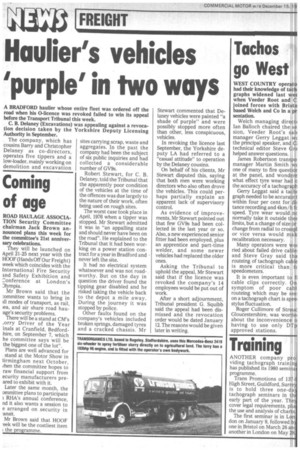Haulier's vehicles 'purple' in two ways
Page 20

If you've noticed an error in this article please click here to report it so we can fix it.
A BRADFORD haulier whose entire fleet was ordered off the road when his 0-licence was revoked failed to win its appeal before the Transport Tribunal this week.
C. B. Delaney (Excavations) was appealing against a revocation decision taken by the Yorkshire Deputy Licensing Authority in September.
The company, which has cousins Barry and Christopher Delaney as co-directors, operates five tippers and a low-loader, mainly working on demolition and excavation sites carrying scrap, waste and aggregates. In the past the company had been the subject of six public inquiries and had collected a considerable number of GV9s.
Robert Stewart, for C. B. Delaney, told the Tribunal that the apparently poor condition of the vehicles at the time of the offences was due largely to the nature of their work, often being used on rough sites.
The worst case took place in April, 1976 when a tipper was stopped. Mr Stewart admitted it was in "an appalling state and should never have been on the road". He explained to the Tribunal that it had been working on a power station contract for a year in Bradford and never left the site.
It had no electrical system whatsoever and was not roadworthy. But on the day in question the driver found the tipping gear disabled and he risked taking the vehicle back to the depot a mile away. During the journey it was stopped by police.
Other faults found on the company's vehicles included broken springs, damaged tyres and a cracked chassis. Mr Stewart commented that Delaney vehicles were painted "a shade of purple" and were possibly stopped more often than other, less conspicuous, vehicles.
In revoking the licence last September, the Yorkshire deputy LA had referred to a "casual attitude" to operation by the Delaney cousins.
On behalf of his clients, Mr Stewart disputed this, saying that both men were working directors who also often drove the vehicles. This could perhaps partially explain an apparent lack of supervisory control.
As evidence of improvements, Mr Stewart pointed out that few GV9s had been collected in the last year or so. Also, a new experienced senior fitter had been employed, plus an apprentice and part-time welder, and some newer vehicles had replaced the older ones.
Asking the Tribunal to uphold the appeal, Mr Stewart said that if the licence was revoked the company's 14 employees would be put out of work.
After a short adjournment, Tribunal president G. Squibb said the appeal had been dismissed and the revocation order would be dated January 12. The reasons would be given later in writing.




















































































































